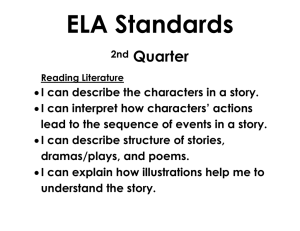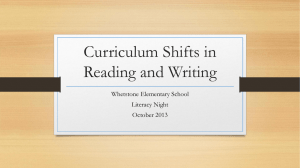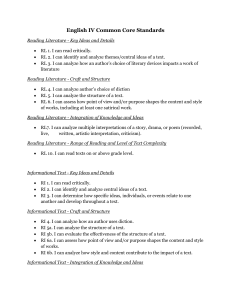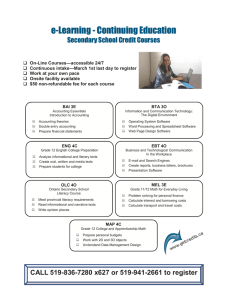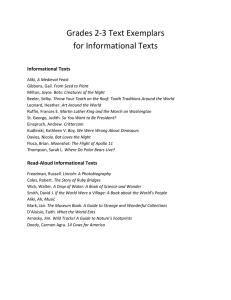Third Grade: Reading (Literary, Informational, Foundational
advertisement
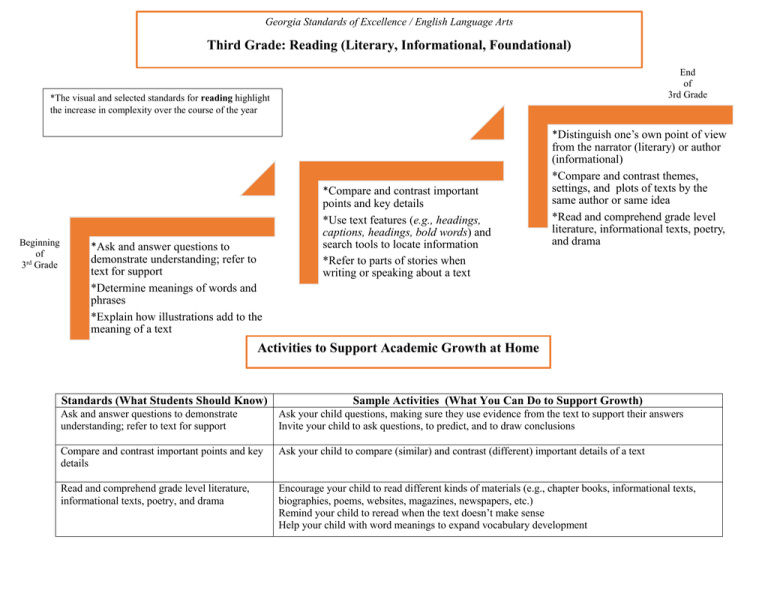
Georgia Standards of Excellence / English Language Arts Third Grade: Reading (Literary, Informational, Foundational) End of 3rd Grade *The visual and selected standards for reading highlight the increase in complexity over the course of the year Kindergarten: Reading (Foundational, Literary, Informational) Beginning of 3rd Grade *Ask and answer questions to demonstrate understanding; refer to text for support *Determine meanings of words and phrases *Explain how illustrations add to the meaning of a text *Compare and contrast important points and key details *Use text features (e.g., headings, captions, headings, bold words) and search tools to locate information *Refer to parts of stories when writing or speaking about a text *Distinguish one’s own point of view from the narrator (literary) or author (informational) *Compare and contrast themes, settings, and plots of texts by the same author or same idea *Read and comprehend grade level literature, informational texts, poetry, and drama Activities to Support Academic Growth at Home Standards (What Students Should Know) Sample Activities (What You Can Do to Support Growth) Ask and answer questions to demonstrate understanding; refer to text for support Ask your child questions, making sure they use evidence from the text to support their answers Invite your child to ask questions, to predict, and to draw conclusions Compare and contrast important points and key details Ask your child to compare (similar) and contrast (different) important details of a text Read and comprehend grade level literature, informational texts, poetry, and drama Encourage your child to read different kinds of materials (e.g., chapter books, informational texts, biographies, poems, websites, magazines, newspapers, etc.) Remind your child to reread when the text doesn’t make sense Help your child with word meanings to expand vocabulary development Georgia Standards of Excellence / English Language Arts Third Grade: Writing End of 3rd Grade *The visual and selected standards for writing highlight the increase in complexity over the course of the year Kindergarten: Reading (Foundational, Literary, Informational) Beginning of 3rd Grade *Write opinion pieces that include reasons to support the opinion, linking words (e.g., because, since) and concluding statements *With support, develop and strengthen writing by planning, revising and editing *Write informative/ expository texts with facts, definitions, linking words (e.g., also, but) and concluding statements *Recall information from experiences or gather information from print and digital sources; take brief notes *Conduct short research projects *Write routinely over extended periods of time and shorter time frames *With guidance and support, use a variety of tools, including digital and collaboration with peers, to produce writing Activities to Support Academic Growth at Home Standards (What Students Should Know) Sample Activities (What You Can Do to Support Growth) Write opinion pieces that include reasons to support the opinion, linking words (e.g., because, since) and concluding statements Ask your child to write about a topic, stating opinions and providing reasons to support their opinion With support, develop and strengthen writing by planning, revising and editing Share with your child the importance of planning, revising, and editing their writing Provide feedback on their writing pieces Recall information from experiences or gather information from print and digital sources; take brief notes Help your child write notes from multiple sources (e.g., books, magazines, websites) to be used in short research reports Georgia Standards of Excellence / English Language Arts Third Grade: Speaking and Listening *The visual and selected standards for speaking and listening highlight the increase in complexity over the Kindergarten: course of the year Beginning of 3rd Grade End of 3rd Grade Reading (Foundational, Literary, Informational) *Report on a topic or text, tell a story, or recount an experience with details *Ask and answer questions about information heard from a speaker *Summarize written text read aloud or information presented in diverse media or formats (e.g., videos, websites, powerpoint presentations) *Create engaging audio recordings of stories and poems to support fluency (the ability to read accurately, quickly, and with expression) *Speak in complete sentences *Speak clearly at an understandable pace Activities to Support Academic Growth at Home Standards (What Students Should Know) Sample Activities (What You Can Do to Support Growth) Speak clearly at an understandable pace Help your child prepare and give oral reports on different topics Ask and answer questions about information heard from a speaker Have your child ask and answer questions about information heard from another person Create engaging audio recordings of stories and poems to support fluency the ability (to read accurately, quickly, and with expression) Invite your child to record his/her oral reading to enhance fluency Georgia Standards of Excellence / English Language Arts Third Grade: Language End of 3rd Grade *The visual and selected standards for language highlight the increase in complexity over the course of Kindergarten: the year Reading (Foundational, Literary, Informational) *Write legibly in cursive Beginning of 3rd Grade *Ensure subject-verb agreement (e.g., Maya goes to band practice. Maya and Max go to band practice) *Use known root words to determine meaning of unknown word *Explain the function of nouns, pronouns, adjectives, verbs, and adverbs *Use possessives (e.g., Sue’s, hers) *Consult reference materials (e.g., dictionaries, glossaries, thresaurus, dictionary.com) to determine meanings and spellings of words Activities to Support Academic Growth at Home Standard (What Students Need to Know) Sample Activities (What You Can Do to Support Growth) Explain the function of nouns, pronouns, adjectives, verbs, and adverbs Provide opportunities for your child to correctly use nouns, pronouns, adjectives, verbs, and adverbs when speaking and writing Use known root words to determine meaning of unknown word Help your child figure out new words by looking at the root, prefix, suffix and other word clues within the sentence (e.g., unsuccessful) prefix root suffix x Write legibly in cursive Encourage your child to practice writing in cursive by writing their names, spelling words, and sentences in a notebook or journal
